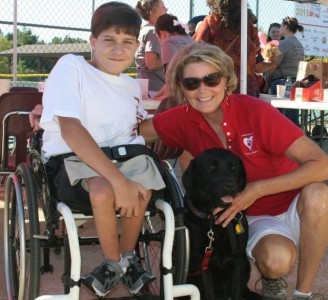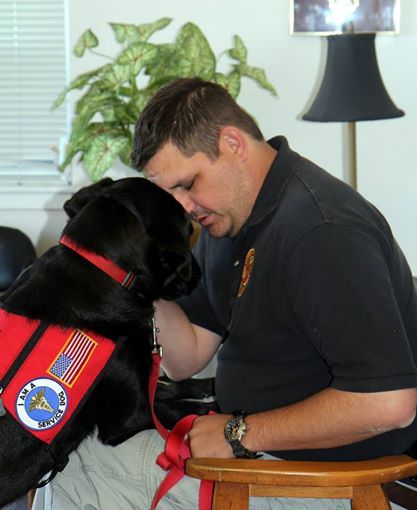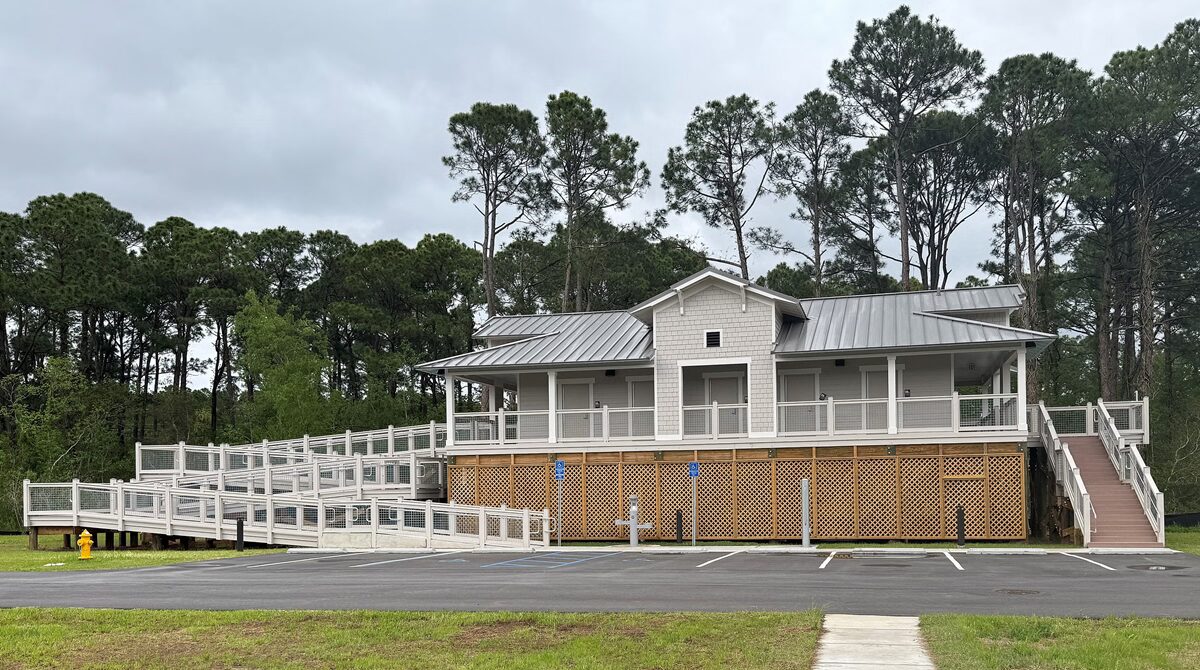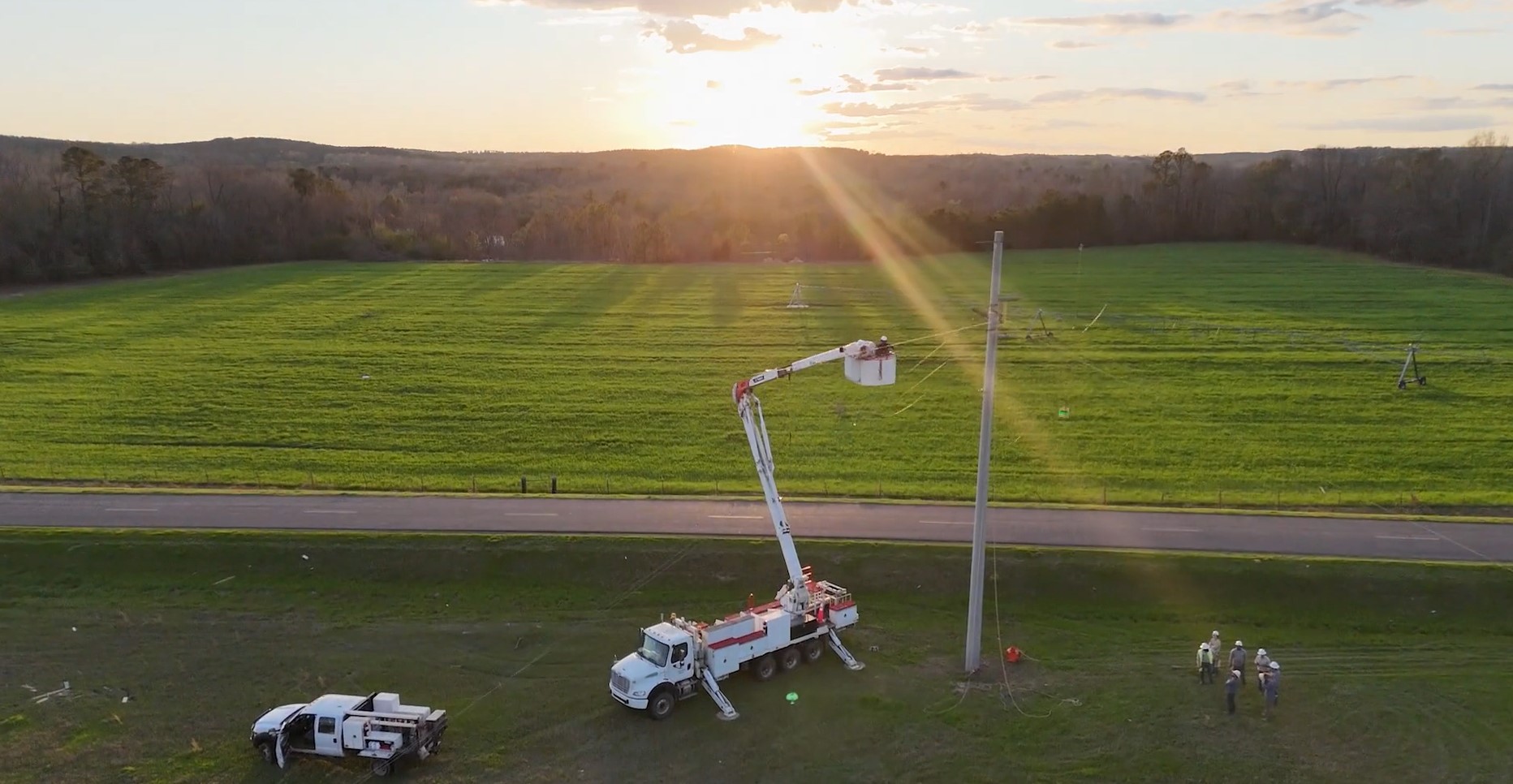Service Dogs Alabama enriches lives, warms souls

Retired U.S. Army Sgt. Darrell Wilson has been helped by Toby the Labradoodle, who is trained for intervention in post-traumatic stress disorder cases and to detect seizures. (contributed)
If you want to know how much the Montgomery-based nonprofit Service Dogs Alabama helps people with disabilities to get better, consider the perspective of Lilith P., who posted the following on the greatnonprofits.org website:
“This program helps EVERYONE involved, from the dogs who get rescued from shelters, the trainers in the prison who never reoffend, society at large because the inmates who train come back into society more healthy and law-abiding, and most of all, the homes where the dogs are placed. These dogs bring safety, peace and joy to children and veterans otherwise experiencing difficulty, and the effects are nothing short of miraculous.”
“Want to know what makes this an even better program? People in need aren’t turned away because they don’t have thousands of dollars to pay for the dog; this program GIVES the dogs to qualified families who can be responsible for the upkeep of the service animal.”
“My family attended the service dog graduation this year, and I was just in tears when I saw how much the program helps people. We are currently awaiting our son’s service dog through this program, and we have high hopes for a positive transformation in his life as I’ve seen happen in the lives of other children.”

SDA Founder Frances McGowin, along with Ben and a service dog named Princess, who is trained to provide assistance for a person in a wheelchair.
Service Dogs Alabama seems to inspire that kind of heartfelt story. It’s made an indelible impression even on its founder and executive director, Frances McGowin.
“This is the most amazing thing I’ve ever done in my life,” she said.
Connor and McGowin’s therapy dog, Bear, in in the hospital. Bear is credited with waking Connor from a coma.
In a nutshell, Service Dogs Alabama (SDA) provides animals to help children and veterans with disabilities, and young adults – up to age 23 – who need a service dog to help them complete their education. The nonprofit provides the dogs free of charge to Alabama residents all over the state.
The free part is a particularly big deal. “A service dog is usually between $8,000 and $20,000, depending on what they do,” McGowin said.
Since SDA began in 2010, more than 125 dogs have been rescued, adopted, trained and awarded to people who need canine help. About 50 or so of those dogs have been awarded to people who need full-service dogs or emotional support dogs, while the rest have gone to people who need or want a trained companion pet. The level of training makes all the difference, McGowin said.
Beginnings
Before Service Dogs Alabama, McGowin, a counselor by profession, started a therapy dog program in Montgomery known as Dogs on Call. Her friend Ashley Taylor worked with her as a member, a volunteer with Dogs on Call. The two women had long histories of working with animals, McGowin said.
“Both Ashley and I have been dog trainers since a very young age,” she said. “We were two of those people who rescued every stray dog we ever saw. When I was 12 years old, I could train dogs to do circus tricks, you know, walk on their hind legs, roll over, jump over barrels. It was very easy for me to train dogs.”

Connor and McGowin’s therapy dog, Bear, in in the hospital. Bear is credited with waking Connor from a coma.
McGowin and Taylor both liked to rescue dogs and saw that the therapy dogs, which they took into hospitals, were more than well received. They were effective.
“We started getting requests for service dogs because the children in the therapy centers who were disabled were making so much progress with the therapy dogs there that they thought a service dog would really help. … When we were working in the therapy dog program and saw what a huge difference the dogs were making in people’s lives that were in the hospitals, that were in the detention centers, in the schools, in therapy sessions – when you see that, then you realize that there is something magical going on that’s beyond what we’re actually seeing.”
McGowin said there was a specific incident in 2010 that made the potential crystal clear for her. It involved a boy named Connor.
“I had one of my therapy dogs in a hospital here in Montgomery visiting a child who was in a horrible bus accident, and he was in a coma,” she said. “And so he was not conscious, and his family just wanted me to bring a dog in because he had loved dogs, and had tried to wake him up, and he was not waking up so they just didn’t know what was going on.
“I took the dog to see him, put the dog in the bed and took his hand and as soon as his hand touched my dog’s head, he woke up out of the coma.” She said she has heard of other incidents like that, where just the presence of a friendly animal promoted a remarkable recovery. “I don’t know if I would have believed it if it hadn’t happened to me,” she said.
The story gets more remarkable from there.
“We left, because the doctors came in and everything.” McGowin said. “But he slipped back into the coma the next day. … And his grandmother called me at 7 o’clock in the morning and said, ‘They can’t wake him back up. Can you please bring your dog back?’ My dog was a big Labrador retriever named Bear. And so I took Bear back and the same thing: Put Bear in the bed with him and took his hand, and I started stroking Bear’s head with his hand, and he woke up again,” McGowin said.
“And he sat up in the bed and they were able to ask him questions, which was the first time he spoke. And he was calm. And from that time on, the whole time he was in the hospital, we went every day,” she said. “It was pretty spectacular.”
Public works
Together, McGowin and Taylor developed K9s 4 Kids, which eventually expanded its mission and changed its name to Service Dogs Alabama. As the name implies, the dogs they train have complex tasks to perform going beyond what therapy dogs do.
“We train the dogs for public access,” McGowin said. “We train dogs to live a certain lifestyle. It is not the same thing as going to obedience classes and learning obedience. We are training the dogs to work all the time. And they have to adjust to that type of a lifestyle. It is way too stressful for some dogs.

SDA Head Trainer Ashley Taylor, Gaige, Emma and McGowin.
“Therapy dogs are one thing. They go see somebody; they go home; they relax. A service dog is on-duty all the time. They aren’t at a school for a reading program for two hours. They are at a school all day long with a child and then sometimes at a sports activity after school and then somewhere else with a lot of kids and a lot of stimulation going on and working the whole time.”

Sgt. Joshua Grantham, retired from U.S. Marine Corp Special Operations with his faithful companion, a service dog named Hank, trained in PTSD intervention.

Princess Sofia, a Papillion mix, is trained to help Paisley with traumatic brain injury intervention.
Because of the rigors of what service dogs are expected to do, not all dogs can be certified to perform at that level. While trained dogs have various benefits to people with different needs, only trained service dogs are “happy in public,” as McGowin said, and able to do consistently what is required. Some breeds work better than others.
Labrador retrievers, McGowin said, make better service dogs. “Labrador retrievers have a higher tolerance for stress than any other dog. They are compact dogs so they fit under tables easily in restaurants, and in school, under desks easily. But they’re large enough to be able to do the things we need,” she said.
“For instance with children with Asperger’s, with autism, we train them to do a thing called ‘compression,’ which is lie on top of the child to press against their chest. And they need to be heavy enough to make a difference because compression tends to release endorphins. Like a hug.”
Labrador retrievers also don’t shed as much as some breeds, are big enough to “not get stepped on,” and “they don’t become protective” the way a German shepherd would, McGowin said.
“It’s very hard to help somebody if your dog is growling at somebody who’s trying to get near you. German shepherds are very sensitive about when somebody is having a weakness and so, that’s when they become protective. A Labrador retriever will sense a weakness, but he will do a command or whatever he was taught.”
Expansion
“We are just now tapping into the potential of what dogs can do,” McGowin said. Early in 2016, SDA expects to expand its diabetic alert dog program. Dogs with the proper training can sense by smell when a person’s blood glucose level becomes either higher or lower than it should be. “They are life-saving dogs,” McGowin said. “There’s such a great need for them because they’re so expensive if you try to purchase one.”
How expensive? “Anywhere from $10,000 to $30,000,” McGowin said. Not surprisingly, while getting one of their dogs is free, recipients have to qualify in very specific ways.
The nonprofit, which has a small staff – McGowin is the only full-time employee – is funded through donations and grants. Trainers are either part time, volunteers, or in many cases, inmates at a private, medium security women’s correctional facility in Florida. McGowin, who previously worked as a contracted program developer at Julia B. Tutwiler prison in Alabama, has also seen how working with dogs has been a saving grace for the inmates who train them.

Service dog Charm attended retired U.S. Navy Sgt. Woodruff’s Ph.D graduation at the University of Alabama.
“The recidivism rate for the inmates who have been training service dogs at their facility is zero percent,” McGowin said. “You have to keep yourself emotionally stable and work on yourself in order to be a good dog trainer, because otherwise the dogs pick up on your emotional insecurities and your fears, and the dogs just collapse under having a trainer who has no confidence. So it is as much a therapeutic tool to increase the confidence and leadership of an inmate as it is to train a dog.”
Some inmates have trained dogs while incarcerated for more than a decade, and when they get out of prison, they stay in touch and even continue to work with SDA.
The organization is also expanding another way, into a 43-acre site south of Montgomery which will house a 60-kennel boarding facility which will also generate income to expand the diabetic alert dog program, and space to begin breeding dogs – diabetic alert dogs have to be trained as puppies. The site will also allow Service Dogs Alabama to build a retreat for clients, including a park where they can bring the dogs and engage an ongoing support network. The new facility should be open by midyear in 2016.
SDA is in the midst of a capital raising campaign – you can give through their website. You also can connect with the organization if you’re interested in getting a dog – the requirements are listed – and volunteering. Right now, McGowin said, they’re looking for volunteer puppy raisers and “socializers.”
As the program and facilities expand, McGowin said the mission remains the same: “Helping animals and people live a quality and full life.”
For more information, visit Service Dogs Alabama, email info@servicedogsalabama.org or call 334-462-2463





